Camper FAQs is reader-supported. Buying through links on our site may earn us an affiliate commission. As an Amazon Associate I earn from qualifying purchases.
Peppermint oil and chili oil are two proven mice repellants that are backed by scientific studies. Combine them with properly sealing off your camper and removing any food sources, and you’ll effectively keep mice out.
But what about dryer sheets, Irish Spring soap, mothballs, and other home remedies popular with RVers?
Below, I’ll show you exactly what products and methods are proven to work and other tips to fully mouseproof your RV!
Proven Mouse Repellents
1. Peppermint Oil
Peppermint oil is a natural mouse repellent. You can use cotton balls and soak them in peppermint oil to keep the mice away. Just place the cotton balls in areas where you found mice droppings. You can also pour some of the oil in corners and holes where you suspect the presence of mice. The good thing about peppermint oil is that it has a refreshing smell that lingers, so it will also fight off any bad smells caused by mice in your camper.

Peppermint Essential Oil (16 Ounce Bottle)
Price:Clicking this link to make a purchase may earn us a commission at no additional cost to you.
2. Chili Oil
Chili oil is a popular ingredient that can cause discomfort if eaten or breathed in. Because of this, it’s thought that the strong smell of chili oil might be enough to keep mice away.
Researchers from Chulalongkorn University decided to test this idea by studying how mice reacted to natural smells like chili. They found that the strong smell of chili stopped the mice from returning to the bait.

Chili Oil
Price:Clicking this link to make a purchase may earn us a commission at no additional cost to you.
3. Live Traps
Live traps are an effective and humane way to get rid of mice by trapping them while keeping them alive. You then just have to release the mouse, preferably far away from your camper. The downside is that you can only catch one mouse at a time, so you’ll want to set multiple mouse traps if you believe you have an infestation.

Humane Live Mouse Trap
Price:Clicking this link to make a purchase may earn us a commission at no additional cost to you.
Important: Avoid using poison to kill mice as it has a negative impact on the environment and the mice may spread the poisons to other areas and animals. Moreover, poisoned mice often hide (and die) in holes that you can’t easily detect. You’ll then be dealing with a nasty smell that’s hard to eliminate.
Potential Repellents
Now, let’s look at mouse deterrents that RVers swear by but have little to support their claims except anecdotal evidence. That’s not to say that these options don’t work, there’s just little to no evidence other than personal anecdotes that I could find that they repel mice.
1. Dryer Sheets
Dryer sheets are not an effective mouse control solution, and contrary to what some campers believe, there’s no evidence that they prevent mice.
2. Irish Spring
Irish Spring is another scent-based repellent that some claim to have had success with, but there’s no evidence other than personal anecdotes that Irish Spring does anything. Even if it had a minimal effect as a repellant, I wouldn’t recommend it as the sole solution to your rodent problems.
3. Ammonia
Ammonia is commonly cited as an effective way to repel mice. However, studies show that the presence of ammonia does not affect their behavior.
4. Moth Balls
Mothballs, essentially fabric clusters drenched in a chemical called Naphthalene, can potentially lead to serious health issues if inhaled excessively. Symptoms can range from nausea and dizziness to more severe conditions such as damage to the kidneys and liver. A study by the National Toxicology Program aimed to assess if these severe effects were also present in mice. The findings revealed that Naphthalene heightened the risk of tissue degradation in the nasal canal and triggered lung inflammation in mice. However, these adverse effects may not be sufficient to dissuade mice from the vicinity of the mothball.
5. Pine-Sol
Like most other scent-based repellents, Pine-Sol may slightly deter rodents, but it’s not an effective solution for keeping mice out of your camper.
How to Actually Mouse Proof A Camper

To mouse-proof your camper, you need to think beyond repellents. The most effective form of pest control is removing any entry points so they can’t get in, then using a rodent repellent as a last line of defense.
Let’s first look at why mice would even want to enter your camper in the first place.
Why Mice Love Your Camper
Believe it or not, your camper, especially when stored for the season, provides the perfect environment for mice.
- Mice prefer dark and confined places where they can eat and reproduce without being disturbed.
- Campers also provide valuable protection from harsh weather conditions and temperature drops. This is why it’s more common for mice to invade your camper in winter (and another reason you should learn how to winterize your camper properly).
- Parking your camper near a food source, like a trash bin at a campsite, or leaving crumbs and open food containers in your vehicle increases the chance that mice and other critters will make it their home.
As you can see, campers, whether a small camper van or a large Class-A, provide the ideal living space for rodents. Now, couple that with easy entry into most RVs, and you can see why mouse infestations are such a common occurrence.
Where Do Mice Enter a Camper?

Mice have flexible skeletons, allowing them to fit through the tiniest holes in your camper.
Did you know…
A mouse can squeeze through a hole the diameter of a normal-sized pen!
Even if they don’t initially fit through the opening, they will chew on the sides to make it big enough for their small bodies.
So, it’s important to first identify the spots where rodents will likely enter your camper.
- Cracks around doors are arguably the most common way for mice to enter your camper. They can squeeze through even the smallest cracks.
- Pipes that haven’t been properly sealed will also be tempting for mice to explore. Metal pipes might not be properly aligned, so there will be enough space for mice to squeeze their bodies.
- Engine openings should be properly sealed after you’ve maintained your camper. At the end of the season, you’ve probably had your RV checked so it can be safely stored. Ensure that all rubber caps have been added to their original places to prevent the entry of these rodents.
- There may be a few fragile spots or holes in the floor where the mice can go through.
- Corners are weak spots that represent easy entry spots. They tend to deteriorate quickly and become more fragile with exposure to the elements.
- Windows that are left open are inviting for mice and rats. Leaving a small crack because you didn’t close the window properly is a common entry point for these rodents.
- Leaving food in your camper is another reason mice will be eager to make it their new home. Mice have a strong sense of smell and are always looking for food. Combine that with warm and quiet shelter, and you are basically asking mice to come in.
Now, let’s identify these entry points in your camper.
Tip: Print this page (or view it on your mobile device) and check off each step as you go.
- Use a flashlight and crawl under the RV to examine the bottom. Even the smallest holes will be big enough for a small mouse.
- Take your camper out in the sun and examine it carefully. If you see the sunlight shining through the walls and closed doors, then there are probably cracks that need to be carefully sealed. You can also use a flashlight at night with someone else outside the camper to check for cracks that need to be sealed.
- Examine all the corners of your camper as they are often weak spots that might let mice through.
- Check out the wiring and plumbing on the RV. There might be some gaps around the pipes that allow mice to crawl into your camper.
- Take a look at all the rubber seals. Rubber gets dry with time, making it easy for mice to break and chew. Doing regular maintenance by replacing the old seals will help secure your camper.
- Examine all the vents and other access panels in your camper. These might not be properly sealed on the outside, allowing mice to easily enter your camper.
- If your camper has a storage area, examine it properly. Many people forget about the storage area and leave it unattended, so mice will find it extremely comfortable and cozy. Check all the entry points and see if there are any holes that need to be fixed.
After identifying the potential risky spots, you should seal them. This will cut off access to your camper, effectively mouse-proofing it.
Sealing Off Your Camper
Here’s what you can do to seal your camper and mouseproof it.
- Use expandable spray foam to secure and close all the cracks. This foam dries to fill in the gaps that let mice through.
- A steel wool and caulk mixture is a popular option to seal cracks and prevent mice. The caulk seals the hole while the sharp metal fibers of the steel wool ensure they can’t chew through it.
- Replace all damaged seals to ensure that mice and rats can’t chew on the dry and cracked rubber.
- Seal any gaps around piping and wiring that have entry points from the outside.
- Use wire mesh screens on the vents and windows to ensure there are no openings where mice can get through.
- Check out the old vents. Have all the old ones replaced and ensure the new ones fit properly to minimize access.
- Use nighttime lighting because mice and rodents hate light. Add some lights that automatically turn on to disturb mice so they don’t feel comfortable in your camper.
Additional Measures
Properly sealing your camper and using a proven mouse deterrent covers about 99% of what you need to do to effectively keep vermin out of your RV. But to 100% (or as close to 100% as possible) ensure you don’t return to your RV and find a mouse infestation, there are a few additional steps to consider. Most of these are just good hygiene practices you should be following whether you have a mouse problem or not.
- After a camping trip, clear all unnecessary items from the camper. Mice love clutter, so make sure that there are no hidden areas where they can build their nests.
- Don’t keep any food items in the camper if you’re not planning to go on a trip soon.
- Cleanliness is key. Thoroughly clean the RV of any spills or crumbs that might tempt mice to enter your camper, and vacuum/sweep regularly.
- Use a cleaning detergent to clean all the flat surfaces in your kitchen, including counters, floors, cabinets, etc., and underneath furniture (sofas, beds, chairs, etc.).
- Don’t store your camper in a woody or grassy area if possible.
- Keep your camper away from water sources, dumpsters, and bird feeders, as they tend to attract rodents.
- Don’t store any pet food in the garage if you’re parking your camper there.
- Mice won’t just eat food remains. They will shred up papers, wires, insulation, clothes, and towels and use them for nesting. Remove what you can of these before storing your rig.
- A regular inspection for mouse droppings and other signs of mice in your motorhome or travel trailer will allow you to take any necessary action before an infestation can occur.
Takeaway
Certain scents like peppermint oil and chili oil can be somewhat effective in keeping mice away. But they won’t stop a determined mouse from entering your recreational vehicle. Prevention starts with sealing off ALL entry points in your RV, then relying on scent-based repellents afterward.
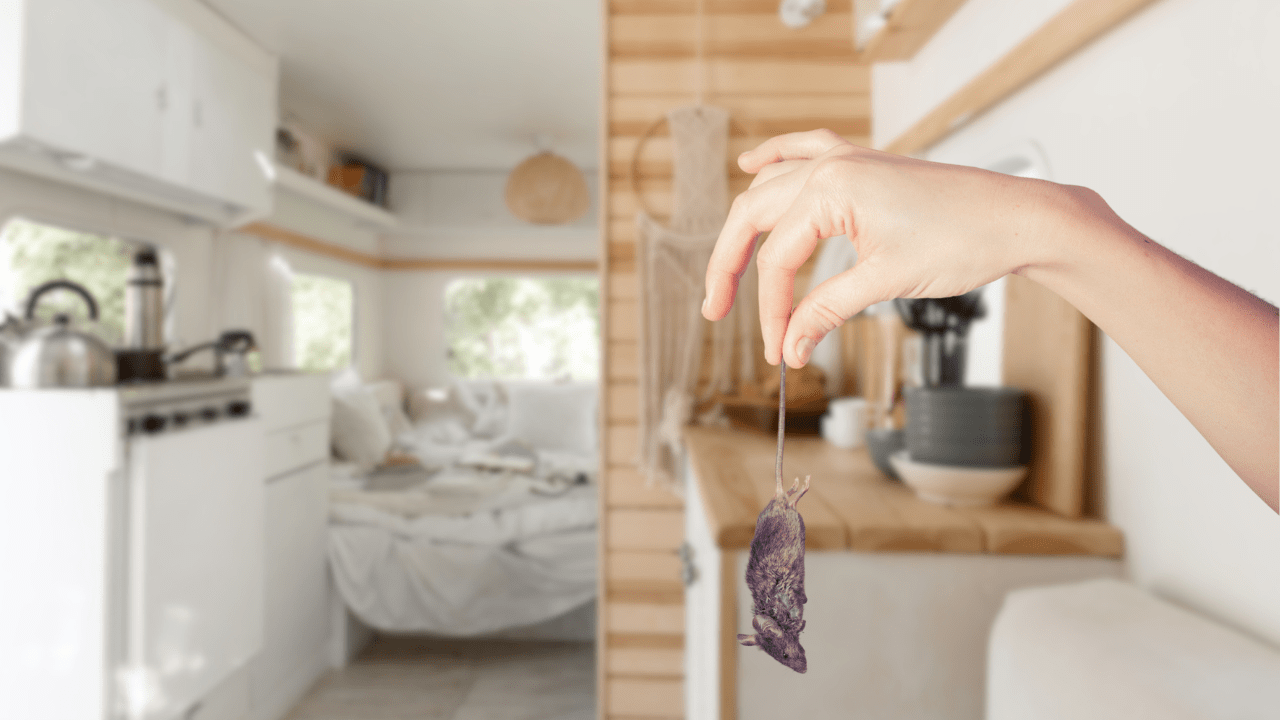
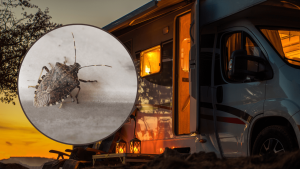
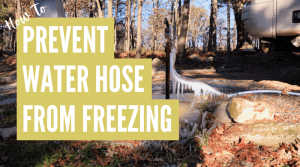

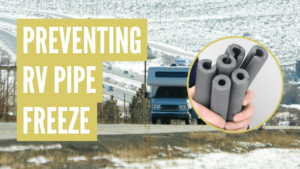

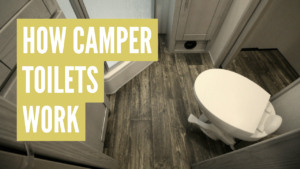
Great article! I’ve tried the bell and howell mouse repellent device. I didn’t have any mice after using it but I cant say fro certain that it was the reason.
Living in Florida means protecting your home, RV and everything from roaches, too. I use peppermint oil to repel them as well, especially in the garage. Any small opening will be an entryway. If a door is left open, it is an invitation for anything that creeps and crawls. I don’t have a problem with either mice or roaches, but I’m not sure about the geckos! They do run right in a door opened! I started using this oil after seeing a video on YT showing how mice are repelled by peppermint oil, so I ordered it to prevent any future problem. Our TT sat in an open field for 6 months before moving it to a graveled lot and we had no mice or roaches or creepy-crawlies. I make pomanders and put the cotton balls in them and hang them in the kitchen and bathroom. Nice!
Thank you for all of the helpful advice. When we bought our dream RV we think that it may have come with free mice.
Presently we have been using a variety traps and have caught several of the little goomers. I also purchased a set of the Bell and Howell mice repellents (fewer droppings.)
We are going to follow your advice about sealing up entries. Will update you on results. Mice be gone!
Many thanks for the suggestions.
You’re welcome! Good luck and do keep us updated with your progress! 🙂